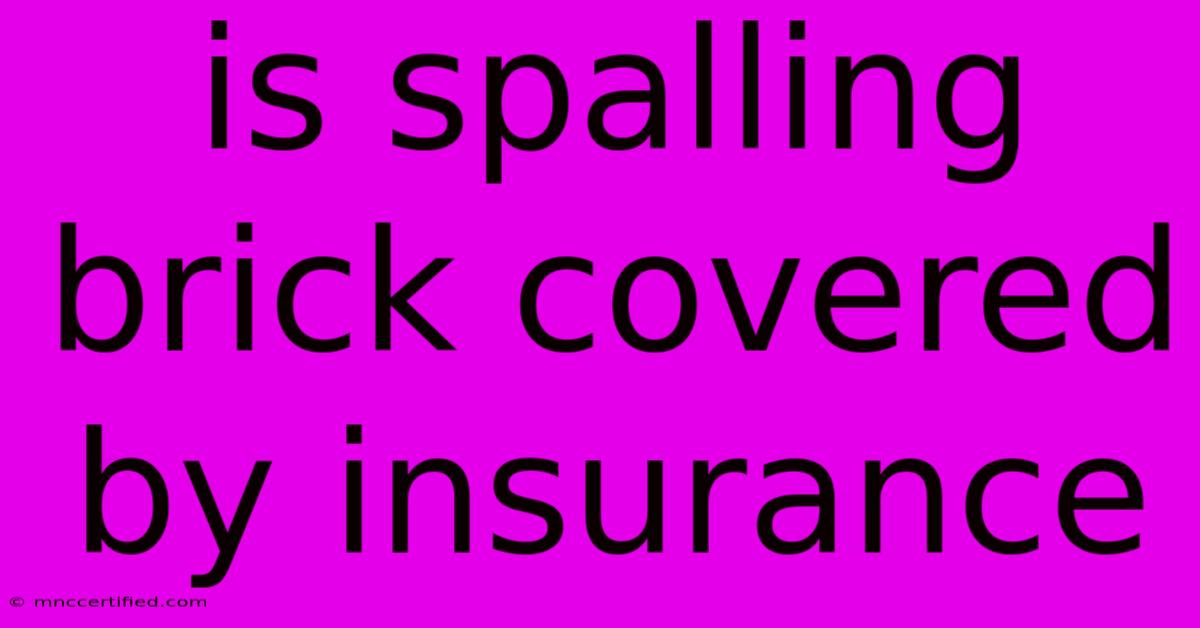Is Spalling Brick Covered By Insurance

Table of Contents
Is Spalling Brick Covered by Insurance? A Comprehensive Guide
Spalling brick is a common problem that can affect the exterior of your home, leaving unsightly blemishes and potentially compromising the structural integrity of your property. If you're facing this issue, you might be wondering whether your homeowner's insurance will cover the repairs. The answer, unfortunately, isn't straightforward.
Understanding Spalling Brick:
Spalling brick occurs when the brick deteriorates and breaks apart, often due to factors like:
- Weathering: Extreme temperatures, frost, and rain can weaken the mortar and brick over time.
- Poor Installation: Incorrectly installed brickwork can lead to cracks and spalling.
- Foundation Movement: Shifting ground can put pressure on the brickwork, causing damage.
- Chemical Exposure: Certain chemicals, like those found in de-icing salts, can corrode the brick.
When Your Insurance Might Cover Spalling Brick:
While spalling is usually considered normal wear and tear, your insurance might cover it under specific circumstances:
- Sudden and Accidental Damage: If the spalling is caused by a sudden and unexpected event like a hailstorm, falling tree, or fire, your insurance policy might cover the repairs.
- Neglect: If you can prove that the spalling was caused by the neglect of a previous owner, your insurance might cover it.
- Coverage for Specific Events: Some policies offer additional coverage for specific events, like natural disasters, that can lead to spalling.
When Your Insurance Likely Won't Cover Spalling Brick:
- Wear and Tear: General weathering and age-related deterioration are typically not covered by insurance.
- Poor Maintenance: If the spalling is due to lack of maintenance, like failing to repair cracks promptly, your insurance might not cover it.
- Pre-existing Conditions: If the spalling was present before you purchased the property, your insurance likely won't cover it.
How to Determine Coverage:
The best way to determine if your insurance will cover spalling brick is to contact your insurance company directly. They can review your policy and assess the situation to provide you with a definitive answer.
Here are some things to keep in mind:
- Read your policy carefully: Understand the specifics of your coverage and any exclusions.
- Document the damage: Take photos and videos of the spalling and keep a record of any repairs you've made.
- Communicate with your insurance agent: Be transparent about the situation and any contributing factors.
Taking Action:
Whether or not your insurance covers the repairs, it's important to address spalling brick to protect your property and prevent further damage. Here are some steps you can take:
- Consult a professional: A qualified brick mason can assess the damage and provide repair options.
- Consider preventative measures: Regular maintenance, like cleaning and sealing your brickwork, can help prevent future spalling.
Remember, even if your insurance doesn't cover the entire repair cost, you might still be eligible for partial coverage. By understanding your policy and working closely with your insurance company, you can navigate this situation effectively and protect your investment.

Thank you for visiting our website wich cover about Is Spalling Brick Covered By Insurance. We hope the information provided has been useful to you. Feel free to contact us if you have any questions or need further assistance. See you next time and dont miss to bookmark.
Featured Posts
-
Platinum Insurance Group Google Review
Nov 09, 2024
-
Health Insurance Brokers Charleston Sc
Nov 09, 2024
-
Original Gap Toothed Girl Georgina Cooper Dead
Nov 09, 2024
-
How Much Is Crna Malpractice Insurance
Nov 09, 2024
-
Backlash For Nicole Scherzingers Russell Comment
Nov 09, 2024